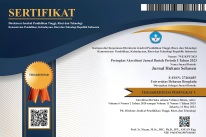Force Majeure As A Ground For Exemption From Breach Of Contract In Civil Law
Abstract
An agreement or contract is a legally binding arrangement between parties to fulfill the rights and obligations that have been mutually agreed upon. In practice, contracts serve as important instruments to ensure legal certainty, justice, and protection for the parties involved in civil legal relationships. However, contract implementation does not always proceed as planned. One of the common obstacles is the occurrence of force majeure, which refers to events or situations beyond human control that are unpredictable and unavoidable, resulting in one party's inability to fulfill their contractual obligations. This condition raises legal issues regarding the liability of the non- performing party and whether such a failure can be justified under the law as grounds for exemption from breach of contract.This study aims to analyze how force majeure can serve as a legal basis for exemption from liability in cases of breach of contract within the context of Indonesian civil law. The research adopts a normative juridical method by examining statutory regulations, particularly Articles 1244 and 1245 of the Indonesian Civil Code (KUHPerdata), supported by analysis of relevant jurisprudence and legal doctrines. The findings indicate that an event may be categorized as force majeure if it fulfills the elements of unpredictability, inevitability, and a direct causal link to the non-performance of obligations. In such cases, exemption from liability may only be granted if the affected party can prove the absence of fault or negligence on their part. Therefore, this study recommends that force majeure clauses be explicitly, comprehensively, and contextually included in every contract as a preventive legal measure to mitigate legal risks and protect contracting
parties, particularly in the face of unforeseen social, economic, or natural disruptions.
Downloads
Copyright (c) 2025 Nathasya Jhonray Siregar, Tasya Amira Frananda Siregar

This work is licensed under a Creative Commons Attribution-ShareAlike 4.0 International License.






